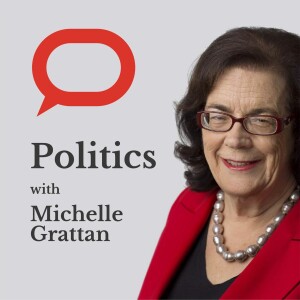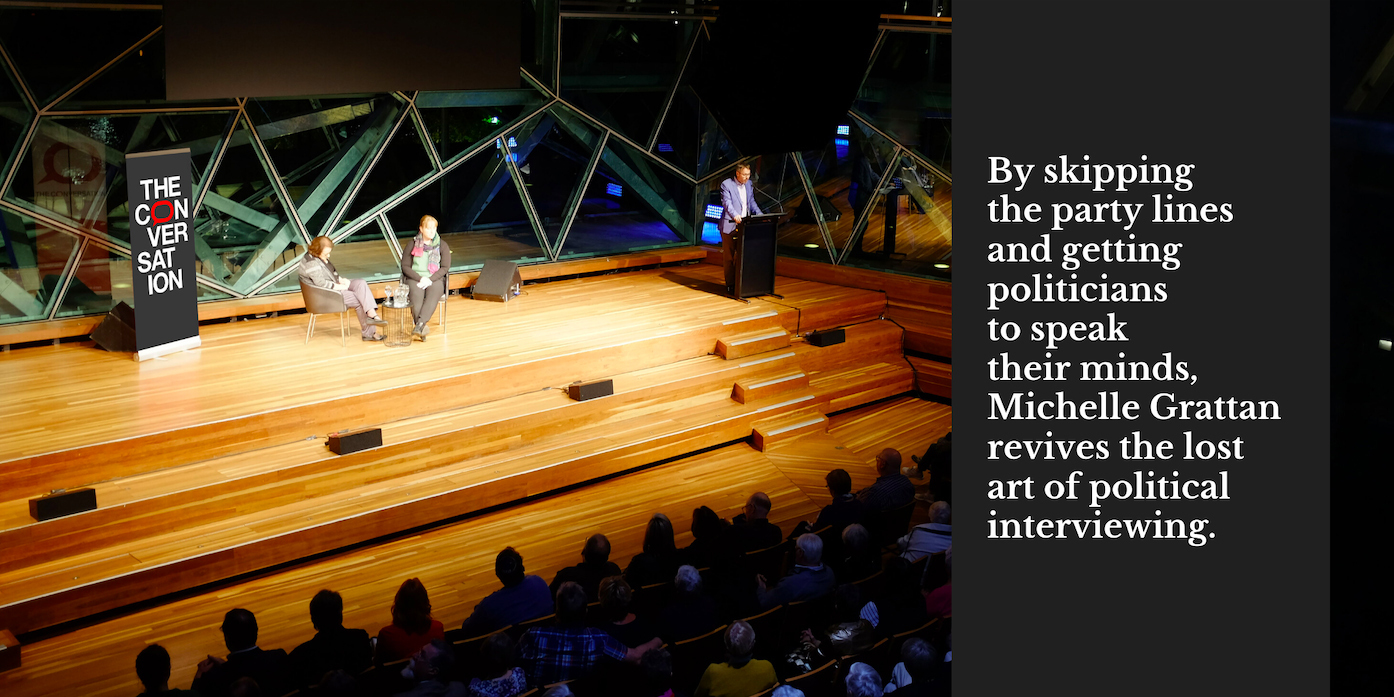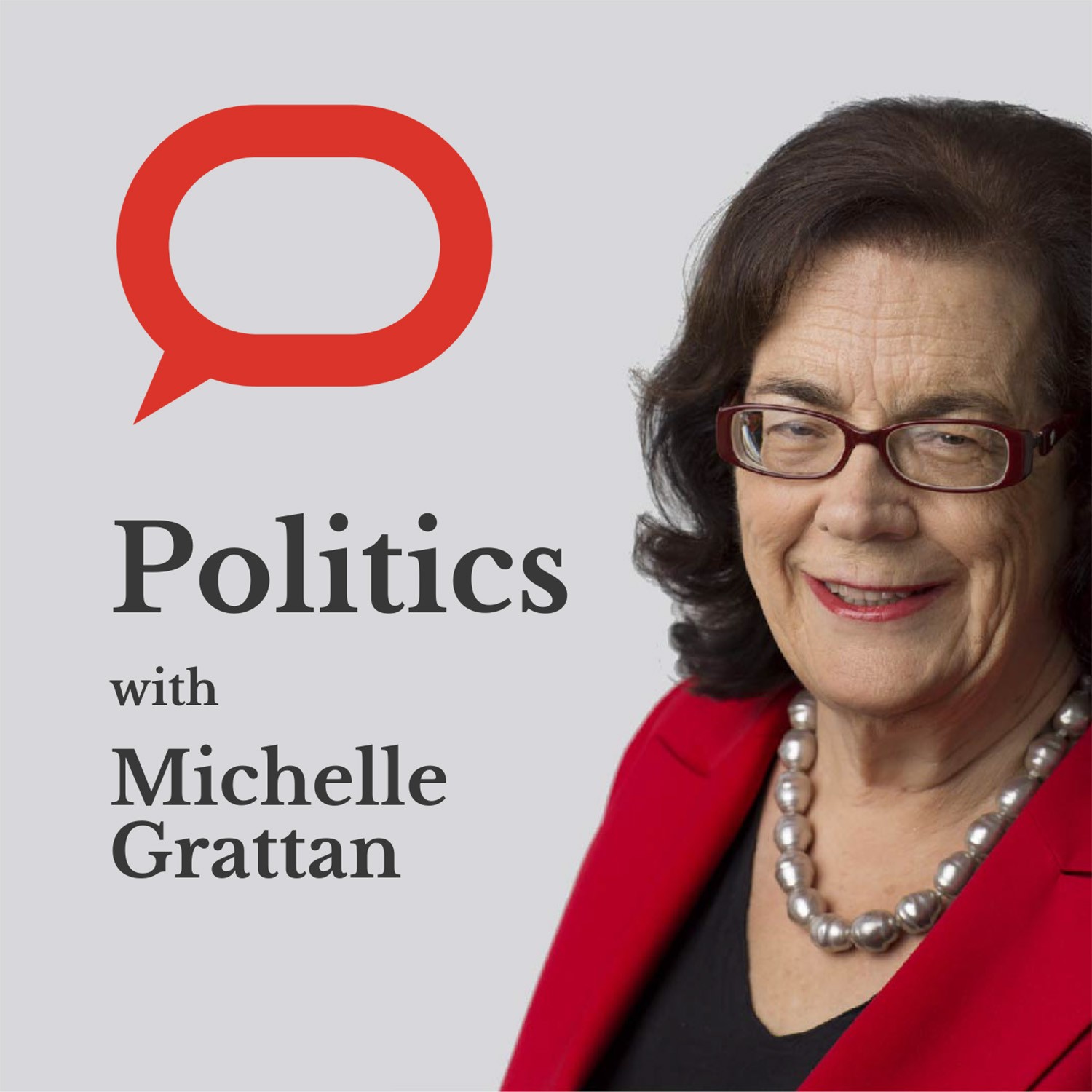Episodes

Wednesday Oct 27, 2021
Keith Pitt on the climate plan and coal’s future
Wednesday Oct 27, 2021
Wednesday Oct 27, 2021
Resources minister Keith Pitt might have been a “no” when the Nationals debated the government’s climate plan but he was a winner in the deal struck between Scott Morrison and the Coalition’s minor partner. He has been restored to cabinet, just months after Barnaby Joyce relegated him to the outer ministry.
The coal industry faces a bleak future as the world tackles global warming. But Pitt, a forthright voice for coal, is anxious to provide reassurance that the climate plan will not do anything to accelerate its decline.
“We’re not closing the coal sector, we’re not closing the gas sector, we’re not closing offshore oil. We will continue to work on markets that are available.”
He says right now thermal coal is in a “very strong position [..] we’ve got more people involved and employed in thermal coal mining than we’ve had since 2012.
"In the midst of the pandemic, thermal coal was under $50 US spot price - it’s currently over $240 [US].”
“We’ve looked at the International Energy Agency forecast […] they’re saying there’ll be continued increases in demand for thermal coal out to about 2030, and I expect it to drop off peak by about 2050 by around 20 per cent. So there’s still coal-fired power stations being built. There’s still demand. And keep in mind, we have one of the highest quality products in the world. That’s why there’s demand for Australian coal.”
Pitt is coy when pressed on what the Nationals got out of their negotiations with Scott Morrison – apart from his elevation and a commitment to having the Productivity Commission review progress of the plan every five years. “I’m sure we’ll have more to say in coming weeks […] there’s always process.”
On how Nationals members are feeling after the rough ride over the climate plan Pitt says, “this is a democracy at work and in Canberra nearly every decision is difficult […] we’re all knockabout sort of people”.

Tuesday Oct 26, 2021
Scott Morrison’s (thin) climate plan for Glasgow
Tuesday Oct 26, 2021
Tuesday Oct 26, 2021
As well as Michelle Grattan’s usual interviews with experts and politicians about the news of the day, Politics with Michelle Grattan now includes “Word from The Hill”, where all things political will be discussed with members of The Conversation’s politics team.
In this week’s episode, they canvass the government’s plan, released on Tuesday, to get to net-zero emissions reduction by 2050. It relies overwhelmingly on technology, some of which is yet to be developed. Scott Morrison’s mantra is “technology not taxes” but his plan spends a lot of taxpayer money to drive his technology journey.
The experts are already sceptical about the plan’s thinness, and the detailed modelling is still to come. Meanwhile, after all that Coalition agonising, the safeguards the Nationals obtained remain mostly under wraps.

Thursday Oct 21, 2021
Phil Honeywood on the challenges of getting international students back
Thursday Oct 21, 2021
Thursday Oct 21, 2021
COVID-19 has meant international students have been unable to arrive in Australia to commence their studies, devastating one of our most profitable sectors.
We’re joined in this podcast by Phil Honeywood, CEO of the International Education Association of Australia to talk about the impact of the pandemic on universities, students, and the economy – and the way forward.
Honeywood says the data shows many international students have voted with their feet and given up their Australian courses to study elsewhere – Britain, Canada, and now even United States under Joe Biden’s more open door policy.
“For example, UK university international student enrolments are up over 30% year on year. […] They’re recruiting full fee, paying international students at Australia’s expense, and we lose enormous market share to those countries because they’ve kept the doors open largely throughout the pandemic.”
“And as we know, that has also reverberated across our agriculture, horticultural and hospitality sectors in our economy who’ve relied very heavily on international students to fill the low skilled jobs.”
One problem in restarting the industry is what Honeywood calls a “pass the parcel syndrome”.
“On the one hand, the federal government say, yes state government can be masters of their own destiny and put up a student return plan which the federal government endorsed. On the other hand, when it looked as though we’re going to have large numbers of international students coming back in one state, the federal government remind everybody that no, actually they control Border Force. They control visa entry into the country and they will choose to tell the state to get back to its box.”
Honeywood criticises the Home Affairs Department for being unwilling to endorse student visas for Africans. These students go to the Uk in “the tens of thousands” but “our Home Affairs Department who issue student visas […] seem to prefer to just say no to African students”.
Honeywood also says “it’s really important to understand the motivation of young people who want to study in another country. For many of them, it’s a chance to obviously explore their own personality, to prove their resilience.”
A report released this week by the International Education Association of Australia titled ‘Student Voices’ found that “the appetite for face-to-face study in Australia is a primary driver”.

Tuesday Oct 19, 2021
Mustering the government’s rural rump into the 2050 tent
Tuesday Oct 19, 2021
Tuesday Oct 19, 2021
As well as Michelle Grattan’s usual interviews with experts and politicians about the news of the day, Politics with Michelle Grattan now includes “Word from The Hill”, where all things political will be discussed with members of The Conversations’s politics team.
In this week’s episode, politics + society editor Amanda Dunn and Michelle discuss the tortuous negotiations with the Nationals over the 2050 net zero target the PM intends to take to Glasgow. The Nationals claim they’re not holding the government to ransom, but they’re playing hardball in extracting protections for the regions.
They also canvass Anthony Albanese’s reference of Labor MP Anthony Byrne – who gave sensational evidence to IBAC last week about branch stacking – to the Finance Department to determine whether he breached rules by employing taxpayer-funded staff who didn’t even turn up at the office.

Wednesday Oct 13, 2021
Grattan Institute’s Tony Wood on managing the shift in climate policy
Wednesday Oct 13, 2021
Wednesday Oct 13, 2021
The Morrison Government is in the painful throes of a climate policy shift to embrace a target of net zero by 2050, ahead of next month’s Glasgow conference. This requires a deal with the divided, noisy, fractious Nationals.
We’re joined in this podcast by Tony Wood, Director of the Energy Program at the Grattan Institute, to talk about Glasgow, Australia’s policy and the fallout from the necessary transition to lower emissions.
“[The government] will talk about […] how technology will be fundamentally important to meeting a net zero target. And that’s absolutely true,” Wood says.
[But] policy will be important as well.
“The government job, then, is to address the barriers and issues that arise.
"In some cases, it will mean losses of jobs in some sectors, but it also means growth of jobs in other sectors. And that’s where the big opportunities lie.
"Sectors actually are not really looking to be protected from the consequences of reducing emissions. In fact, they want to be part of the process of driving these changes, so they can actually have some control over their destiny,” Wood says.
“So the farming community wants to be part of the solution. They’ve already committed themselves to net zero by dates which are much earlier than 2050. And now the Business Council, which represents some of those big mining companies for example, they’ve also committed to net zero by 2050.
"As you think about winners and losers […] we do know that one thing is for certain – that losers shout about their losses much more than the winners boast about their gains.
"So what the government puts in place to try and bring those areas of the economy along with them, where the concerns will arise, will be fundamentally important. They will obviously have had to provide some sort of concessions in the announcements around how they’re going to ensure that rural and regional and mining communities are being considered in this process.”

Tuesday Oct 12, 2021
Word from The Hill: A prime minister, a prince and the ‘last chance saloon’.
Tuesday Oct 12, 2021
Tuesday Oct 12, 2021
As well as Michelle Grattan’s usual interviews with experts and politicians about the news of the day, Politics with Michelle Grattan now includes “Word from The Hill”, where all things political will be discussed with members of The Conversations’s politics team.
In this week’s episode, they canvass Scott Morrison’s signal he now does want to go to Glasgow, as even Prince Charles increases the pressure on him to attend the “last chance saloon”. This comes as crunch time looms for the Nationals to agree to a new government climate policy.
Meanwhile the admission by federal Labor MP Anthony Byrne be branch stacked leaves Anthony Albanese is an awkward position as he prepares for the election.

Thursday Oct 07, 2021
Thursday Oct 07, 2021
After Gladys Berejiklian’s resignation over an investigation by the NSW Independent Commission Against Corruption (ICAC), the debate about the federal government’s proposed – but weak – federal integrity commission is heating up.
Stephen Charles, a former Victorian judge who is a director of the Centre for Public Integrity, says the Coalition should totally rework its draft model to give it real teeth in dealing with politicians and public servants.
Pointing out that under the government draft, investigations of politicians wouldn’t have public hearings, Charles asks, “What does that show you about the concern they have of their activities being exposed? And […] remember the hundreds of thousands and millions of dollars that this coalition has shown it is prepared to spend […] to its electoral advantage rather than in the interests of the public.”
“Australia is a signatory to the United Nations Convention Against Corruption. Article 36 of that convention requires Australia to have an effective body to deal with corruption, and those of us who’ve been arguing for a national integrity body have been pointing to Australia’s failure to comply with its obligations under UNCAC for a long time now.”
Charles agrees with the need to prevent the integrity commission being used by political players for their own purposes. “These powers must not be allowed to be weaponised by […] the political party in power at the time.”
“The body should be under the control of the judicial system, which in this case would mean under the control of the federal court […] there should be an inspector, and next there should be a parliamentary committee which should have its activities under continual review.” With those protections, misuse could be prevented, Charles says.

Wednesday Sep 29, 2021
The push to run independents on issues of climate and integrity
Wednesday Sep 29, 2021
Wednesday Sep 29, 2021
With the 2022 election looming, local activists are mobilising in many government seats to sponsor independent candidates. The push – stronger and more organised since the 2019 election – is driven especially by concerns about climate change and integrity issues, as well as the general declining faith in the major parties,
There will be substantial money and campaigning help for the more viable independent candidates. Businessman Simon Holmes à Court, with his Climate 200, is putting together a war chest that currently has more than $1.5 million, while former independent member for Indi, Cathy McGowan, who pioneered the “Voices” movement, is assisting local groups with advice on how to mobilise support.
Asked why people have shifted towards campaigns such as ‘Voices of’, Holmes à Court says these groups “are being set up by people who feel really let down”. He says expected target seats include Wentworth, North Sydney and Mackellar in Sydney, and Flinders, Kooyong and Goldstein in Melbourne. Hume may be also on the list. “There is a very strong ‘vote Angus [Taylor] out’ group [that] makes that an interesting seat as well.”
Noting many of the “Voices” groups are in safe seats, McGowan says “there’s a sense that if you’re in a marginal seat, you get better service from either the government or the opposition. But if you’re in a safe seat for either of those teams, you get missed out on… [the locals] want better representation and then they want more, certainly on policy areas”.
She points out crossbenchers can be “really effective. […] And I think people like the calibre of the crossbench. And in many cases they’re much, much more effective than a backbench, either in the opposition or in the government.”

Tuesday Sep 28, 2021
Coalition free-for-all over 2050 target
Tuesday Sep 28, 2021
Tuesday Sep 28, 2021
As well as her interviews with politicians and experts, Politics with Michelle Grattan now includes “Word from The Hill”, where she discusses the news with members of The Conversation politics team.
In this episode, politics + society Senior Deputy Editor Justin Bergman and Michelle canvass the internal brawling that’s happening – which has included Nationals minister Bridget McKenzie attacking treasurer Josh Frydenberg – as Scott Morrison seeks a deal with Barnaby Joyce for the government to endorse a target of net zero emissions by 2050 for the Glasgow climate conference.
They also discuss Morrison’s indication this week that he mightn’t go Glasgow. The aftermath of lockdowns could make it a risky time to be out of the country.

Wednesday Sep 22, 2021
British High Commissioner Vicki Treadell on AUKUS and climate change
Wednesday Sep 22, 2021
Wednesday Sep 22, 2021
The New AUKUS security agreement has bound Australia even more tightly to the United States and Britain. But it has brought blowback against all three countries from France – which was blindsided by the cancellation of its contract to supply submarines to Australia.
On another front, Australia is under intense pressure from its two "great and powerful friends", the US and the UK, to improve its ambition on climate change in the run up to the Glasgow conference.
In the wake of AUKUS and on the cusp of Glasgow, we talk to Britain's High Commissioner to Australia, Vicki Treadell, about security and climate.
Treadell says Britain is "deeply disappointed at the reaction from France" following the AUKUS announcement – which included the French cancelling defence talks with the United Kingdom.
"We would hope that they will see the bigger picture, that our partnership from a strategic defence and security point of view should not be diminished. The areas where we already work with them, and likewise America and Australia too. All those things remain for us to work together on."
"Obviously, they are disappointed, but I don't think they should regard it or interpret it as a loss of trust."
She says the French should bear in mind "there is a far more important strategic dynamic to safeguard, to ensure stability and peace in the region".
As for Britain's part in AUKUS, the "gravity has shifted to this region in terms of geopolitics, economics, and therefore we need to be part of this region engaged with it".
Looking to Glasgow, "We want to see high ambition from all the countries participating in COP 26. We see this as a really important economic agenda for the world, the economic transition that we need to make."
"I know that Prime Minister Morrison is working hard towards this, but we do understand the politics of Australia and all we can do as good friends and partners is to encourage and to say that we will be there to work with Australia to realise that level of ambition."
"Australia has a huge opportunity to become a global leader in [...] key clean industries of the future. Australia has an almost unparalleled opportunity to create jobs and growth domestically and also to produce the key inputs needed for economies around the world to decarbonise inputs like clean hydrogen, green materials like steel and aluminium."

